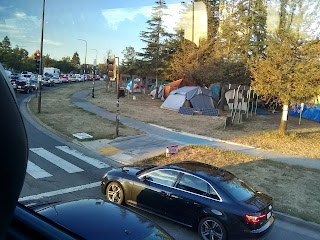This is a letter of reflection on living with the land that I wrote in November 2019 which was read at First Mennonite Church of San Francisco.
Dear friends,
I’m writing to you from the south slope of our mountain up in the redwood forest where I’ve lived since last April. My feet are propped up on a dying madrone, and my head is leaned back against a fir. There are a lot of birds making noise today. I laid here all morning for my mind to slow down enough for words to come. I was asked to write something about land and food. It is hard for me to know what to say.
This land lived with the Cahto people for I don’t know how many thousands of years. And while this forest is thoroughly beautiful, I imagine its mangled body would be barely recognizable to many of them. Almost every tree has been cut, the land itself cut in all directions with roads, slopes stripped of their soil, no longer able to hold the rains on their way to the sea, eroding the streams into deep canyons. And the trees are dying on their own now, whether from drought or toxicity or loneliness, I don’t know.
What does it mean to live with the land? I feel no authority to speak to this. I lay in the forest and weep for what has been done to them and is still done to them. I am sorry. I don’t have an answer, and I cannot turn away. I will be here and ache. They tower above me, they shield each other and my own body from the wind like a thick crowd, solemn, silent. They want me to be here, they want me to see them. I feel this. I hear them whisper to each other in the rustle of leaves. I think they know why I’m here, but I do wonder sometimes what they really think of me. What I feel most from them is love and sadness, and a confidence that they belong.
Do I have any right to ask them to provide for me? I don’t know. They do provide. Even after all the people have taken from them they still sprinkle the ground with acorns, and drop wood for our fire. I am crying right now. I cringe to speak of them and of my own way of life on the same page.
Am I really living off the land? No. Sure, we have plenty of fruit and greens and mushrooms from the land. Our meat and eggs mostly come from friends nearby. The only foods we need to buy from elsewhere are grains, beans, and spices, but that’s still a significant part of what we eat. I can make excuses for myself. There were once abundant salmon here, and now they are so few I have still not seen one. I am not surrounded by a community that knows how to live with this land, while most of our ancestors always were. I have more pressing work to do; if I didn’t, I could gather enough acorns for the year. But I would still cook them in a metal pot that came from who knows where, while wearing clothes from who knows where else, on a fire of wood cut by a chainsaw. Most of what we depend on was produced elsewhere by the industrial system. There is no purity. It’s all tangled up.
And I am still a human animal in the world, this world so beautiful I am speechless in gratitude just to be here. I will delight in the warmth of the fire and the taste of strawberries. I will still try to feed us from the land as much as I can because it feels right. This means looking at what we have and eating that. We eat our own kale, garlic, mushrooms, herbs, and apples almost every day all year. And usually tomatoes or potatoes or squash or carrots or peas. So we can taste the land in our food.
As our industrial and political systems collapse and we can no longer buy the things we used to buy, our relationship with food will change. Here, we will probably end up eating more acorns, and being cold more often, and it’s quite likely that eventually we will go hungry.
I often wonder if it’s also too late for the forests as they are now, if the ecological balance is so upset that they will die soon even if the humans stop actively killing them. I don’t know. Meanwhile I want to love them as much as I’m able. Looking around the forest here I am always reminded that everything dies, and often sooner than we’d wish it to. I find something here to trust. I trust, not that I will live as long as I’d like, or that I will be fed and comfortable for as long as I live. Rather I trust that under all the sorrow and grief and confusion there is still something vast and beautiful that begs my attention and delight, and so I belong here.
I am grateful for the presence of tanoak, with its fuzzy, fatty acorns. I’m grateful for fir and it’s bracing sap scent. For redwood even though its leaves get all tangled in our hair. For madrone, dancing its smooth curves beside the straight solemn conifers. For bay with its rich bitter nuts. Chinquapin with its gnarled branches. Bold yellow maple and soft pink dogwood leaves, those funny alder cones, and the elusive yew. The sweet crunch of manzanita, the shiny huckleberry, spiky whitethorn, and the sticky fragrance of mountain jasmine.

















